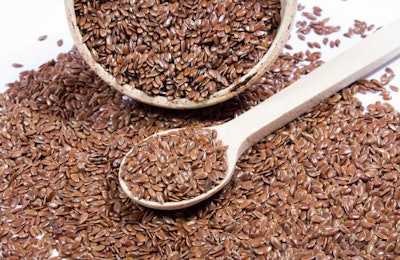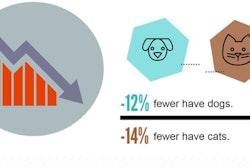
Flaxseed mucilage and calcium may serve as a functional ingredient combo in weight-loss dog food formulations, but more research is needed, said Charlotte Reinhard Bjørnvad, PhD, professor of companion animal internal medicine at the University of Copenhagen. Bjørnvad and her team of veterinary scientists observed that dogs digested less of the fat in their diets when flaxseed mucilage was added to their dog food, especially when calcium was added too.
“The results we present are based on a relatively small group of animals, and we did find some variation between dogs,” said Bjørnvad of her research published in the International Journal of Obesity. “However, we found a decrease in apparent digestibility of fat in the diet supplemented with flaxseed compared with control which indicate that flaxseed supplementation inhibits digestion or absorption of fat in the diet.”
Flaxseed in dog food study
The flaxseed experiment involved eleven privately owned dogs. During three consecutive 14-day periods, the dogs received one of three diets based on a mix of dry and canned commercial dog food. In one, the base dog food was supplemented with flaxseed mucilage and calcium. Another was supplemented with only the flaxseed mucilage. The control diet had only potato starch added.
The dogs’ feces from the last two days of each period was analyzed to determine the influence of the different diets on dogs’ digestion. In the control diet, the apparent digestibility of fat was approximately 97 percent.
However, apparent fat digestibility dropped to approximately 93 percent in the flaxseed mucilage and calcium diet and down to approximately 95 percent in the flaxseed diet. Fat digestibility in the flaxseed mucilage with calcium diet was significantly lower, statistically, than the diet supplemented with only flaxseed mucilage.
Flaxseed mucilage as dog food functional ingredient
By digesting less of the fat they consume, the flaxseed and calcium combo may help in the formulation of weight-control and weight-loss dog foods, but the precise amount that can be safely used for different dog food products has yet to be determined, Bjørnvad said.
“At the levels used in the current study, there should not be any health risks associated with the use of flaxseed mucilage,” she said. “Further, there were no differences in fecal water content or dry matter.”
In pilot studies, higher concentrations of flaxseed mucilage in dog food sometimes caused diarrhea, which stopped when the supplementation ended, noted Bjørnvad. Fermentable fiber in dog food may also increase gas production, although this wasn’t observed in the present study.
There was also a limit to how much mucilage Bjørnvad’s team could mix into the canned food used in the most recent study.
“In the formulation we used, where we mixed flaxseed powder with canned diet, there was a limit to the amount we could implement,” said Bjørnvad. “Maybe it is possible to increase the level of supplementation by implementing it in other pet food formulations, for example dry kibble.”
In her study, Bjørnvad used a patented commercial flaxseed formulation from Zaluvida.


















